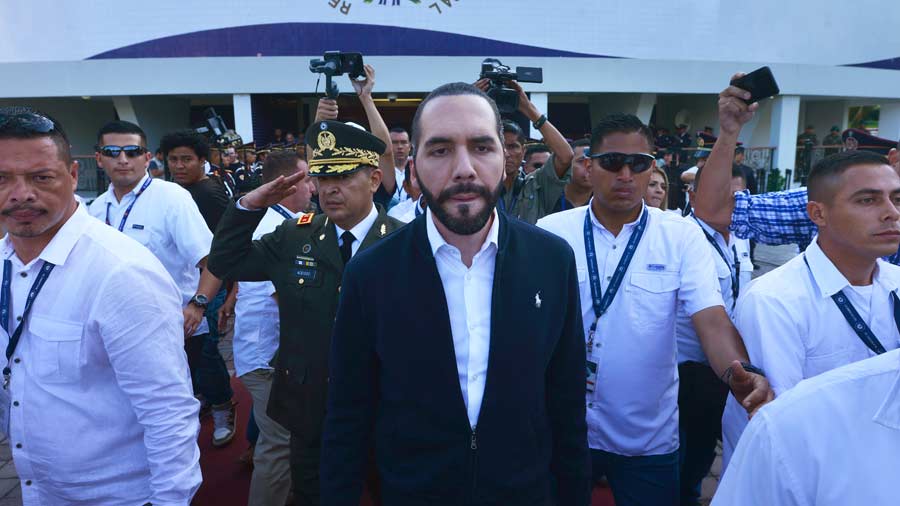
This is a compilation of voices of the participants in the documentary “9F: The return of the rifles”, a joint production of Diari d’Avui and Revista Factum, with the support of journalists from El Far.
Blow, black day, the crossing of an irreversible line, an attack on democracy, a shameful event, a reflection of Nayib Bukele.
These are some of the words used to describe the armed assault on the Legislative Assembly commanded by the President of the Republic on February 9, 2020. This is what the protagonists of the documentary “9F, The Return of the Rifles” said. a co-production of the Diari d’Avui and Revista Factum, with the support of journalists from the Far.
1 Mario Ponce, President of the Legislative Assembly
“9F was remembered as the day of the coup in our democratic system, the day when an attempt was made, say, to destroy the system of freedoms and our democratic system.”
2 José Miguel Vivanco, Human Rights Watch
“February 9 will be remembered as one of the most scandalous events in recent decades in Central America. It is not a matter of pride, but of national shame that a president has been ashamed to turn to the Army in an attempt to intimidate him. ‘Legislative Assembly’.
In addition: Miniseries “9F, the return of rifles” Chapter 4: With Rifles and God
3 Mari Carmen Aponte, former US ambassador. UU
“I would tell you that it was one of the lowest points in the history of El Salvador in the last 40 years. It was very painful. And I hope that, with an alert conscience, all Salvadorans can work so that it does not happen again.”
4 Yanci Urbina, deputy of the FMLN
“On February 9, I think he revealed the very nature of this president, not only undemocratic, but he is a person who has done enormous damage to the country.”
5 Martha Evelyn Batres, deputy of ARENA
“For Salvadorans, it must be a day remembered, but one that will allow you not to go through it again. It was a sign of dictatorship, of authoritarianism towards democratic institutions.”
6 Leonardo Bonilla, non-partisan deputy
“It was definitely a breach of the constitutional order. Whether it has been restored on time or not is still a debate, but at that time there was a breach of the constitutional order.”
7 Rodolfo Gonzalez, former magistrate of the Constitutional Chamber
“It’s the most serious constitutional order alteration event since the end of the war and it didn’t end there.”
8 Bryan Avelar, Factum journalist
“It will be remembered as a day of great threat in democratic terms to El Salvador, for an impetus that had a president who in itself has an authoritarian character.”
Read also: OAS will send Special Mission to El Salvador to assess institutional political situation
9 Jessica Ávalos, Factum journalist
“For me this date was a break, because it showed us what a person with power and a person who does not measure the consequences of their actions can be capable of.”
10 Luis Parada, lawyer and ex-military
“For me it was a black day in the history of El Salvador that marks the breaking of a border, a line that should not have been crossed.”
11 Lissette Lemus, photojournalist for Diari d’Avui
“It will be remembered as the historical fact that marked the beginning of a decline of the democratic state. It has marked the beginning of something great.”
12 Nelson Rauda, journalist of El Far:
“It’s the beginning of the democratic dismantling that Bukele has tried to do when he didn’t even have a year in government.”
13 Carlos Martínez, journalist of El Far
“I think this day represents in a fairly faithful, fairly transparent way and is an excellent summary of who President Nayib Bukele is.”
14 Celia Medrano, human rights defender
“The 9F will be remembered as an immature, dangerous action that stripped the real profile of the current President of the Republic.”
15 Jorge Beltrán, journalist of the Newspaper of Today
“It’s a totally repudiable, reprehensible fact. In a country where the institution works moderately, I think the people responsible should be being prosecuted.”
16 Eugènia Velásquez, journalist of the Newspaper of Today
“As far as my journalistic career goes, it was an unforgettable fact because it reminded me of my childhood, with the war, and it also reminded me that at that moment everything that was gone could have gone to the garbage can. built in the country “.
17 Fernando Romero, journalist of Factum
“I had never seen this display of power, of military power in a public institution where it is not up to him to be in the Armed Forces. I felt it was an invasion. I felt it was an usurpation what the Army was doing.”